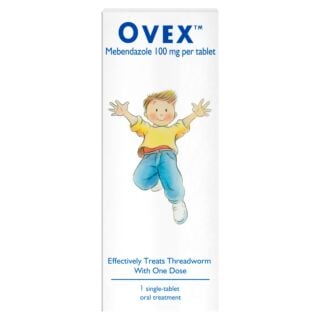What is threadworm and how can I treat it?

Threadworm is a common infection that can affect children and adults. It causes uncomfortable itching and worms in places you’d rather not have them.
If you’re worried about your child picking up threadworm or you’re wondering whether you might have it yourself, then you’ve come to the right place. In this guide, we’ll explore all things threadworm and answer your most frequently asked questions about these annoying little worms.
What is threadworm?
Threadworm, also known as pinworm, is an uncomfortable condition that’s usually more common in children than adults. It happens when your large intestine becomes infected with tiny parasitic threadworms, making you feel uncomfortable and itchy.
You may not notice any symptoms right away, but if you or your child have threadworm, then you may wake up more at night or notice the worms in your poo.
What are the causes of threadworms?
Threadworm happens when you eat threadworm eggs or somehow transfer them into your mouth. These eggs then move into your large intestine, where they’ll hatch and begin laying eggs around your anus.
These eggs can survive for 2 weeks before hatching when the cycle begins again. Threadworms can make your bottom very itchy. If you scratch, the threadworm eggs can get onto your fingers or beneath your fingernails, spreading to other surfaces or into your mouth again.
You can also get these eggs onto your clothes, towels, bedsheets, and more throughout the day, so if one member of your family gets threadworm, it may soon spread throughout the entire family within just a couple of weeks.
What are the symptoms of threadworm?
Threadworm has one tell tale symptom that’s more noticeable than the others, and that’s (you guessed it) the threadworm itself.
Threadworms look like small, white strings of thread, which is where they got their name, and you may notice them in your poo after you’ve been to the toilet.
If you think your child has threadworm, you should check around their bottom in the morning. These small worms may come out overnight while your child is asleep.
Other symptoms of threadworm include intense itching around the anus or vagina, which may feel worse at night.
You may also feel irritable or wake up frequently in the night. Some less frequent symptoms of threadworm include weight loss, wetting the bed, or irritation around your bottom.
What do threadworms look like?
As you can imagine, taking a picture of a threadworm is no easy or enjoyable task.
Don’t worry, we’ve not picked out any of the worse pictures of threadworms for you (trust me, they aren’t pretty!), but if you keep scrolling, you’ll see a picture of these little thread-like worms.
Don’t like worms? Make sure you scroll really fast and keep your eyes closed for this next bit!

How can I treat threadworm?
Threadworm is usually treated with a medication called mebendazole, which is a type of medication known as anthelmintics.
Anthelmintic medications work as an antiparasitic, meaning that mebendazole kills threadworms and is 90–100% effective with every treatment.
However, mebendazole and other antiparasitic medications can’t kill threadworm eggs, which means you’ll need to keep an eye on your personal hygiene for at least 6 weeks after taking your first treatment and may need to take a second dose if your doctor advises that this will work for you.
Can I get threadworm treatment over the counter?
You can buy some threadworm treatments, like Ovex tablets and suspensions, over the counter from your pharmacist.
These remedies are suitable for adults and children, but you’ll need to answer some questions before buying this medication.
This is the same in both online and high-street pharmacies, and it helps your pharmacist ensure that you’re getting the right treatment for your illness.
If they don’t think a specific treatment is right for you or your child, then they’ll be able to recommend another treatment that will help.
Are there any natural threadworm treatments?
There are no natural remedies for threadworm, but there are some things you can do to keep the infection under control.
These things mostly revolve around personal hygiene and breaking the cycle of infection that keeps a threadworm infection around.
For starters, you should try to avoid scratching, as threadworm eggs can stick underneath your fingernails and be transferred to your mouth or onto other surfaces.
One way to prevent scratching is to wear underwear when you go to bed at night.
Change your underwear, pyjamas, and bed linen daily if possible. You should also wash children’s soft toys every day or so.
You should keep your fingernails short until the infection has passed and scrub them clean at least once a day to prevent eggs from sticking beneath them.
Make sure to wash your hands regularly throughout the day, especially before preparing food or eating, and wash around your anus thoroughly in the bath or shower first thing every morning.
You should also vacuum the whole house every day for two weeks after being diagnosed and dust your home with a damp cloth to ensure you’ve cleared away as many eggs as possible.
Are threadworms contagious?
Threadworms are contagious, as their eggs stick to surfaces and skin quite easily, allowing them to be spread easily from place to place.
This is why you may need to treat your whole family for threadworm if one person brings home an infection. It also explains why threadworms are usually more common in children, who are less careful with their personal hygiene.
What if I get threadworm when I’m pregnant?
If you’re pregnant and think you have threadworm, you should speak to your doctor immediately. You won’t be able to take mebendazole, as it isn’t suitable for use during pregnancy, but your doctor may prescribe another treatment for you instead.
They’ll also recommend that you take strict care of your personal hygiene to prevent you from swallowing any more eggs or spreading the infection to other members of your family.

When should I see my doctor?
Typically, you won’t have to see your doctor if you have threadworm, as treatment from your pharmacist is usually enough to treat the infection.
However, you should see your doctor if you’re pregnant and have threadworm or if you have a child younger than 2 who has threadworm.
Children younger than 2 may be prescribed a medication called piperazine, which is suitable for children who are older than 3 months, but this should only be given under medical supervision.












